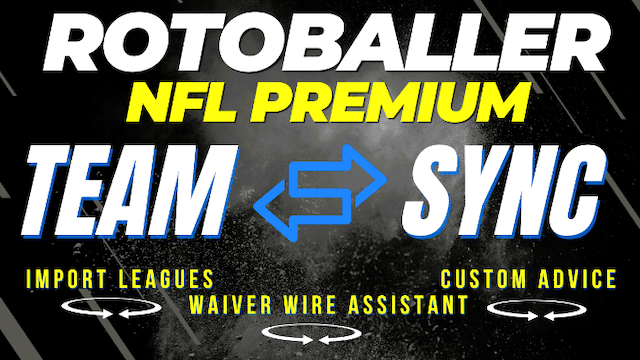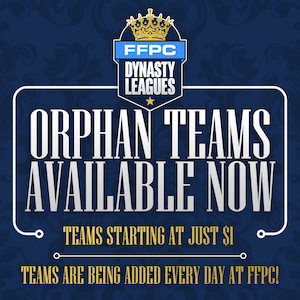Pierre Camus identifies late-round QB and WR stacks that could be league winners in best ball leagues such as FFPC. These quarterback and wide receiver teammates have a low ADP and could bring great return on investment.
Best ball is a different beast than traditional season-long fantasy football leagues. No waivers or trades mean hitting the right draft picks from beginning to end is the sole determinant of success. This is quantified by win rates, or how often a player was rostered on league-winning teams. The results are often unexpected because it's not about having the best players so much as getting the best values.
We toss out the term "value" all the time, but it's the key to playing best-ball successfully. As it turns out, late-round picks are most often the league-winners in best-ball, far more so than in redraft.
Finding this year's late-round QB/WR stack is a great strategy if you know where to look. But where do we begin?
Featured Promo: Looking for some more fantasy football action? Adopt a dynasty orphan team over at FFPC. Sign up today and get $25 off any FFPC league. Sign Up Now!
Components of a Cheap Stack
In 2020, quarterbacks like Justin Herbert and Kirk Cousins posted higher win rates than Patrick Mahomes. For those who don't recall, then-rookie Herbert wasn't the starter in Week 1 and may not have been in the lineup for quite a while if not for an untimely Tyrod Taylor injury. On the receiver side, Jamison Crowder (12%) posted a higher win rate than Keenan Allen (11.5%) and somehow Jakobi Meyers (9.6%) posted a higher win rate than Robert Woods (9.5%) or Terry McLaurin (9.2%).
Again, best-ball leagues are won by identifying the best late-round values at each position. Now, imagine having the QB/WR duo that both generate high win rates.
Some of the best cheap stacks last season included Ryan Tannehill and Corey Davis, with an ADP of 134 and 243 respectively, Teddy Bridgewater (155 ADP) and Robby Anderson (168 ADP), and of course, Kirk Cousins (145 ADP) and Justin Jefferson (167 ADP).
What qualifies as a cheap pair at QB/WR? I would say any player at his position who falls outside the top 100 picks at the very least and isn't expected to fall within the starting lineup. Josh Allen and Stefon Diggs were clear league-winners and even Allen with Cole Beasley was a great stack. However, Allen was selected as QB7 on average last year so he was expected to be a QB1 and not a value pick. Ryan Tannehill was QB19, Kirk Cousins was QB21. That's what made them league-winners.
Here are a few of my favorite stacks once the "starting lineup" has been set and the real action begins.
Matt Ryan / Olamide Zaccheaus, Atlanta Falcons
In 2020, Matt Ryan was taken as the QB8 on average in FFPC leagues, sneaking inside the top 100 picks. This year, he's far more affordable as the QB15. It's understandable considering he no longer has one of the best wide receivers of this generation on his team. Someone has to pick up the slack with all the targets vacated by Julio Jones and the most likely candidate is Russell Gage. But he's not going to post the same win rate as last year because he'll be drafted far higher. In fact, his ADP has risen to 134 overall at WR51, ahead of DeVante Parker.
Keeping it 100, as in Olamide Zaccheaus is the WR100 based on current FFPC ADP, the third receiver in Atlanta will prove to be more valuable than any other in best ball. Zaccheaus was next in line among Falcons receivers with 32 targets and should see that total bump up considerably in 2021. His 13.8 average depth of target (aDoT) was 17th-highest among receivers with at least 30 targets and he's shown proclivity with catching the deep ball. Ryan should chuck enough deep balls his way to make Zaccheaus a strong late-round value paired with a boring but effective pocket passer.
Matt Ryan goes deep to Olamide Zaccheaus for a 51-yard @AtlantaFalcons touchdown!@M_Ryan02 | @LlamaDay | #RiseUpATL
?: #DENvsATL on CBS
?: NFL app // Yahoo Sports app: https://t.co/ul5IFJEdQc pic.twitter.com/7EnIcbOuGE— NFL (@NFL) November 8, 2020
Carson Wentz / Parris Campbell, Indianapolis Colts
If there's one format built for Carson Wentz, it's best-ball. He isn't the type of quarterback we can trust right now as a weekly starter, but he's a potential steal in the later rounds of best-ball leagues if he comes close to his previous level of play. One thing that might help is a better O-line. Indy kept Philip Rivers' pressure rate at 16.5%, one of the lowest among all starting QBs. By contrast, Wentz was pressured the seventh-most times in the league at 29.3% of dropbacks. It also helps that he'll have a much more talented group of receivers.
When looking for a receiver to pair with Wentz, Pittman's ADP is the highest so he's ruled out. It might instinctually make sense to go for T.Y. Hilton at pick 151 as the deep threat and home run hitter in this receiving corps. Wentz was not particularly effective on the deep ball last year, but then again he wasn't really effective at all as illustrated above. Still, I'll opt for Parris Campbell 36 picks later. Campbell only appeared in two games last season after missing more than half of his rookie year due to injury. The risk is clear but the reward could be great. He should serve as the primary slot receiver and safety valve for Wentz, which means plenty of targets.
We can't pretend last year didn't happen. Wentz was flat-out terrible, posting the second-worst CPOE (Completion Percentage Over Expectation) among all QBs at -4.1%. Only Dwayne Haskins was worse. A reunion with Frank Reich, better supporting cast, and fresh start (without the boos) might lead to a resurgence. It's hard to know which receiver he'll take a liking to most but Campbell has the latest ADP yet could easily match the others in production. A QB/TE stack with Jack Doyle is also a smart play.
Derek Carr / Henry Ruggs III, Las Vegas Raiders
If there's one thing Derek Carr can do, it's put up big numbers against the Chiefs. If there's another thing he can do, it's stay on the field. He's only missed two games over his seven-year career. Barely selected as a backup in best-ball, Carr can be had as a very late second option to a high-end QB and affords you the ability to skip a third QB. If there's one last thing Carr can do (I'm sure there are others too), it's throw the deep ball. According to NFL NextGenStats, he had a 124.2 passer rating on deep throws and +14.5% Completion Percentage Over Expectation on such throws.
For these reasons, he promises to put up some big games; Carr went over 300 passing yards six times in 2020 with some late-season spikes that pushed his final 8.6% win rate over the league average of 8.3%. It's also why he can connect with deep-ball threat Henry Ruggs.
Ruggs looked a lot like John Ross 2.0 as a rookie and that's not a compliment. He ran really fast as expected, made a couple of highlight-reel touchdown plays, and spent several games on the sidelines injured. That's not a good look for the first wide receiver selected in the NFL Draft. He will get more chances to prove himself, however, with Nelson Agholor gone and the team implementing more short routes to get the ball in his hands.
Even if Ruggs only goes for a handful of big plays and doesn't see a consistent target share, it doesn't matter much in best ball. Last year, Marquez Valdes-Scantling basically parlayed four big weeks into an 11.3% win rate that was higher than several elite wideouts mentioned above like DeAndre Hopkins, for example. Ruggs could easily break out for some long touchdowns and deliver great return on investment as the WR54 in FFPC leagues. He's getting pricier by the day, though. Ruggs' ADP has risen 25.2 spots over the past month and may keep trending upward if he has a strong showing in training camp.
Jared Goff / Amon-Ra St. Brown, Detroit Lions
The Jared Goff hate is getting out of hand. He's being drafted as the QB29 in FFPC leagues, behind Jameis Winston, who we don't even know whether he'll be a starter. Goff has put up an average of 4,270 passing yards and 25.5 passing touchdowns per season since becoming a full-time starter. Sure, that was with Sean McVay in Los Angeles so we can bake in some depression in his efficiency but having him so low is dismissive of his ability altogether. This Lions team won't be good but that could lead to plenty of negative game scripts and second-half passing. If nothing else, volume will make him a nice value pick.
Pairing him with either Breshad Perriman or Tyrell Williams is fine but the pick here is St. Brown. All three are basically going at the same spot in FFPC leagues with St. Brown at WR75, Perriman at WR76, and Williams at WR78. It comes down to who you believe will lead the team in receiving or, more importantly, who will have the most boom games. Perriman is the fly guy and likely to make some splash plays but he may not get enough opportunities, as this offense figures to be relatively conservative and could feature the slot man predominantly. If he proves to have strong YAC ability, St. Brown would be the smartest pick.
Ryan Fitzpatrick / Cam Sims, Washington Football Team
I'll begin by admitting I'm not completely sold on Fitzmagic. He's going as the QB20, however, so it would be hard for him to not deliver positive return on investment. That's especially the case now as his ADP is dropping after the initial excitement about the prospect of him flinging the ball to Terry McLaurin. Fitzpatrick's ADP has fallen 19 spots over the past month, closer to 150 overall. That alone makes him worth targeting since there is no backup that poses a serious threat for playing time, with all due apologies to Taylor Heinicke and Kyle Allen.
At receiver, the trendy pick is rookie Dyami Brown because of his deep-ball catching prowess and, well, the fact he's a rookie. But Cam Sims was the one who played that role last year and could at least match if not surpass Brown in targets this season. I've previously written about Sims as a talented receiver who could be a late breakout at receiver, especially now that he's paired with the perfect quarterback (for him). Sims was second on the team in receptions and yards last season and had the sixth-highest separation rate among all wide receivers last year.
2020 NFL WR/TE leaders in broken/missed tackles/rec (>40 tgts)
1. Jakeem Grant 38.9%
2. Deebo Samuel 36.4%
3. Laviska Shenault? 31%
4. A.J. Brown 30%
5. Gerald Everett 29.3%
6.. Jerry Jeudy 25%
7. Cooper Kupp 25%
8. Cam Sims 25%
9. Hunter Renfrow 25%
10. Travis Kelce 24.8%— Jody Smith (@JodySmithNFL) July 21, 2021
The 6'5" Alabama product is a bit of a one-trick pony but we've already established that players like MVS can help in best-ball more than you'd think. Take the few big plays and/or games from Sims in the final round of your draft and laugh all the way to the bank.
Download Our Free News & Alerts Mobile App
Like what you see? Download our updated fantasy football app for iPhone and Android with 24x7 player news, injury alerts, rankings, starts/sits & more. All free!

More Best-Ball League Strategy





 RADIO
RADIO


























